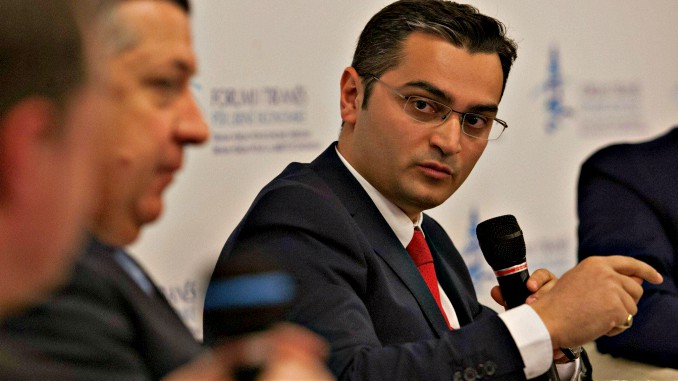
England has a broad culture in sarcasm and many of its political messages are passed on through to the public through humor.
When two friends meet after the 2nd World War to talk on what they did at war, one of the two responds to the question that “I wrote a letter: Please stop the war. When I saw I had no reply, I wrote e second letter.”
Many in Albania today are doing the same thing. They write articles, host endless TV shows, asking politicians to find a common language. But writing is not enough…
Crisis? What Crisis?
After 63 days of non-stop protesting, Albania’s Prime Minister Edi Rama still believes the opposition has the right to ‘commit suicide’. In the same spirit, every time he is asked on the crisis, he replies: “Crisis? What Crisis?”
Ironically, these are also the last words used by former British Prime Minister Jim Callaghan in ‘Winter of Discontent’ in 1979 before losing power to Margaret Thatcher.
A simple consultation with Alastair Campbell would reveal to the prime minister how the “Crisis? What Crisis?” expression has entered history as the wrong thing to say.
The Nash Equilibrium
At the moment both sides are balanced by what in economic science is known as the Nash equilibrium, according to which no player has anything to gain by changing only his or her own strategy, assuming he knows the behavioral strategies of the other players.
In such equilibrium, the LSI, the third biggest party in Albania is backing the SP. This means that the strategy of both SP and DP is such that no one moves from their decision knowing the publicly expressed strategy of both sides.
It is up to LSI on the other side to turn into a first ‘mover’ to take the country into a new equilibrium. However, the LSI, in contrast to its rhetoric, is a follower of SP’s game, and until it makes a move, the prime minister asks Crisis? What Crisis?”
The German Minister and Margaret Thatcher
With politics and Europe changing after the 2008 financial crisis, many expected Germany to become Europe’s political leader, just as it was its economic engine.
Starting with the crisis in Italy, then in Greece, important financial institutions like the IMF increasingly expected Angela Merkel to stand at the forefront of European efforts to solve the multitude of economic and political problems, starting with Grexit, the Euro crisis, the crisis of sovereign debt, bank system, deflation and the migrant crisis. And most recently, even tackle the challenges of Brexit or AFD in Germany and Le Pen in France.
But seen from a distance in time, since the Berlin Wall fell, the European Union has demonstrated that it is more about avoiding the next crisis rather than an alternative alongside the United States for the other regions of the World.
In the 1980’s Margaret Thatcher established a working group in order to understand the German point of view as the country was preparing to enter negotiations with them.
The response she got was in the shape of a short story, where a German painter having painted a detailed view of a prairie seen from his window, realizes he had forgotten to paint a tree. The small forgotten detail bugs and disorients the painter who turning and tossing over uncomfortably during the night in his bed, gets up with an idea to solve the problem. He goes outside with the painting in one hand and an axe in the other… He then begins to cut down the tree in order to make nature resemble the painting, not the opposite.
Therefore, as Germany has started its Berlin Process pushing the Balkan countries to integrate closer with each other and start projects of infrastructural development through roads and railways, means that any new claim over democracy in the Balkans which destroys this ‘painting’ in the German mindset, resembles that tree… and that’s why some ask “Crisis? What Crisis?”.
*Besart Kadia is the Executive Director at the Foundation for Economic Freedom in Tirana, Albania.